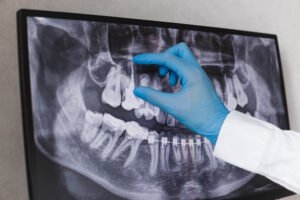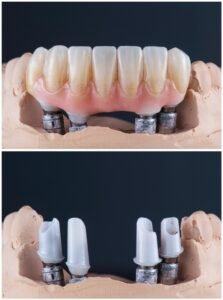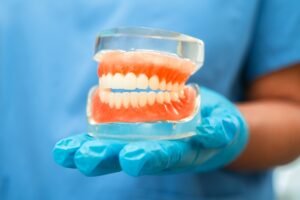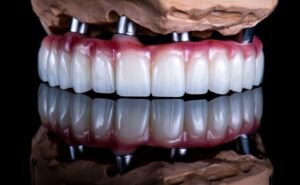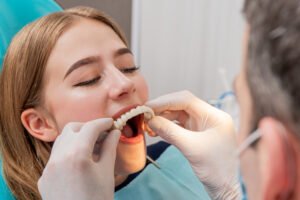A permanent partial denture is a type of denture that can be fixed in the mouth, rather than being removable like traditional partial dentures. This type of denture replacement option can be a great solution for those who only need to replace a few missing teeth and want a more permanent solution than traditional partial dentures.
Missing teeth can make it difficult to eat and speak properly, not to mention the cosmetic concerns they can create. That’s where partial dentures come in. While traditional partial dentures are removable and require daily cleaning, permanent partial dentures are fixed in place and can provide long-lasting results. (Diazepam)
We’ll explore the benefits and drawbacks of permanent partial dentures, as well as what to expect during the fitting process and aftercare. We’ll also compare permanent partial dentures to other tooth replacement options, such as bridges and dental implants.
What Are Permanent Partial Dentures?
Partial dentures are removable artificial teeth attached to a gum-colored base with clasps. However, they can be converted into permanent dentures by fixing them in your mouth. This ensures you do not have to remove them every night and they can replace a few missing teeth.
Permanent partial dentures are prosthetics used to replace one or more missing teeth. They are similar to traditional partial dentures but can be fixed in your mouth permanently, eliminating the need to remove them daily. They consist of artificial teeth secured onto a gum-colored base with metal or plastic clasps. Permanent partial dentures offer better stability and chewing efficiency than traditional ones. You can eat most foods once you get used to wearing them, but hard or sticky foods should be avoided. Permanent partial dentures can replace any number of teeth, from a single tooth to several missing teeth.
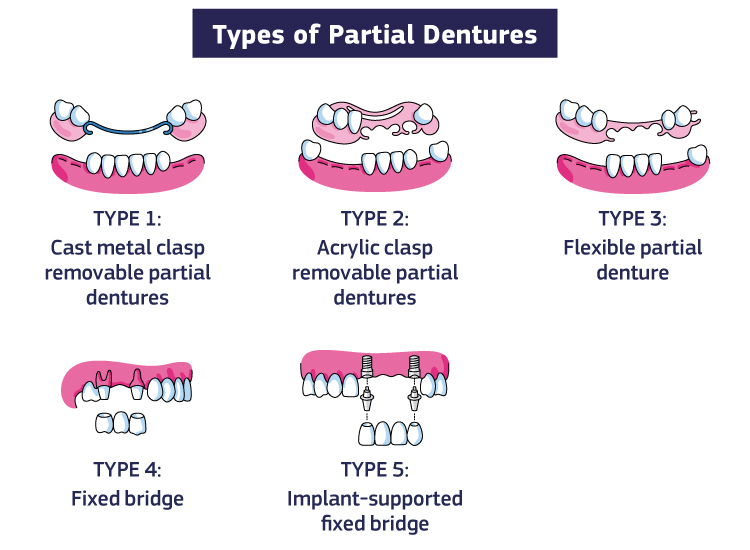
Credit: www.dentureliving.com
Types Of Partial Dentures
A permanent partial denture is a type of dental prosthesis consisting of artificial teeth attached to a gum-colored base. Unlike traditional partial dentures, permanent partial dentures are fixed in place and do not need to be removed each night. This type of denture offers improved stability and biting force, allowing for easier eating of favorite foods.
| Types of Partial Dentures | Pros | Cons |
|---|---|---|
| Fixed Partial Dentures | – Provides better chewing efficiency – Resembles natural teeth – Can stay in place permanently |
– Expensive – Requires good oral hygiene – Not suitable for patients with severe bone loss or gum disease |
| Removable Partial Dentures | – Affordable – Easy to clean – Suitable for patients with bone loss or gum disease |
– May feel uncomfortable – Can move around while eating or talking – Requires regular adjustment |
Partial dentures are a great option for those who have lost a few teeth. There are two types of partial dentures, fixed and removable. Fixed partial dentures provide a natural look and feel but can be expensive and require good oral hygiene. Removable partial dentures are more affordable but may feel uncomfortable and require regular adjustment. (midwaymoving.com) It is important to talk to your dentist about which type of partial denture is right for you. Both options allow patients to enjoy eating most foods without difficulty. Permanent partial dentures are also available and can provide better stability and biting force, but may not be suitable for all patients.
Are Permanent Dentures The Same As Implants?
Permanent partial dentures are not the same as implants, although they can be a long-term solution for replacing several missing teeth. They consist of artificial teeth on a gum-colored base with metal or plastic clasps, which can be converted into permanent dentures by fixing them in your mouth and not removing them at night.
There has been some confusion regarding permanent partial denture and implants. Dental implants are titanium screws inserted into the jawbone, and a ceramic crown is then mounted onto the screw. They are a surgical treatment, whereas partial dentures are removable and have artificial teeth attached to a gum-colored base. Dental implants offer superior stability and chewing efficiency, while partials have the advantage of being more affordable. Age, oral health, and patient preference are all important considerations when deciding between the two treatments. It is important to consult with a dental professional to determine the appropriate course of action.
Process For Getting Permanent Partial Dentures
Permanent partial dentures can be a great option for individuals who want to replace one or more missing teeth. The process for getting these dentures involves several steps. Initially, you’ll need to schedule a consultation with your dentist to discuss your options and determine whether partial dentures are the right choice for you. If you decide to move forward, the next step is preparing your teeth and gums to receive the dentures. Then, impressions/molds will be taken of your mouth to create a custom-fitted denture. Finally, the dentures will be installed, and your dentist will provide you with care instructions. Permanent partial dentures offer better stability and chewing efficiency to enjoy the foods you love. You can eat most foods without difficulty, but try to avoid hard or sticky foods that can damage your dentures.
Cost And Maintenance Of Permanent Partial Dentures
When it comes to the cost of permanent partial dentures, there are a few factors to consider. The materials used and the number of teeth being replaced can affect the overall cost. Additionally, maintenance such as regular cleaning and adjustments by a dentist are important for the longevity of your dentures.
In the United States, factors that affect the cost of permanent partial dentures include the number of teeth being replaced, the materials used, and the location of the dental practice. Insurance coverage for partial dentures varies depending on the policy and provider. It is important to understand the maintenance guidelines for longevity, which include cleaning the dentures daily, avoiding hard and sticky foods, and regular dental check-ups. Potential risks and complications associated with partial dentures may include difficulty speaking or eating, infection, or damage to remaining teeth. While permanent partial dentures offer a more stable option for tooth replacement, removable partial dentures may be more cost-effective. It is important to speak with a dental professional to determine the best option for individual needs and budget.
Comparing Permanent Partial Dentures To Other Treatment Options
Partial dentures are a common option for those with a few missing teeth. While they are typically removable, they can also be converted into permanent dentures by fixing them in your mouth. Permanent partial dentures offer stability and better biting force, making it easy to enjoy the foods you love.
| Comparing Permanent Partial Dentures to Other Treatment Options |
| A glimpse at the different types of partial dentures and other treatment options can help you make an informed decision. Fixed dental bridges are often a denture alternative and are known for their longevity and durability. However, bridges will require removal or trimming of healthy teeth to gain support. Additionally, they do not prevent future bone loss or gum disease. Permanent partial dentures, on the other hand, are less invasive and can replace one or more teeth without relying on the support of other teeth. They fuse to your remaining teeth and jawbone, offering a more natural look and providing stability. Permanent partial dentures are also cost-effective compared to dental implants. |
| Cost Comparison Between Dentures and Bridges |
| The cost of permanent partial dentures is less compared to fixed dental bridges when you factor in the invasive nature of the latter. The price of bridges can range from $1,000 to $3,000 per tooth, whereas dentures can cost anywhere from $300 to $5,000 per plate. Permanent partial dentures can be more affordable, especially if you have only one or two teeth missing. |
| Implants vs. Permanent Partial Dentures |
| Dental implants are a popular long-term solution for missing teeth, but there are pros and cons to consider. Permanent partial dentures do not require invasive surgery and can be more affordable. However, dental implants offer the advantage of preventing the jawbone from deteriorating, and they do not affect the health of your other teeth. They can be more aesthetically pleasing and can also be more comfortable to wear for some people. Ultimately, the choice between implants and permanent partial dentures depends on various factors, including your medical history, your budget, and your personal preferences. |
Risks And Benefits Of Permanent Partial Dentures
Partial dentures can be a solution to replace a few missing teeth in your mouth. Although they are generally removable, partials can also be fixed in your mouth to create a permanent solution. However, there are both risks and benefits to consider before choosing to have permanent partial dentures.
| Benefits of Permanent Partial Dentures: |
| – Provide a natural look and feel |
| – Restore your ability to chew properly |
| – Prevent further tooth decay and gum disease |
| – Help maintain the shape of your face |
| Potential Risks and Complications: |
| – Infection or irritation in the gums |
| – Damage or decay to surrounding teeth |
| – Discomfort or soreness while wearing the dentures |
| – Difficulty speaking or eating certain foods initially |
| How to Minimize Risks: |
| – Properly clean and care for your dentures daily |
| – Regular dental visits to check on the fit and health of your gums and surrounding teeth |
| – Avoid eating hard or sticky foods that may damage the dentures |
| – If discomfort or irritation occurs, contact your dentist immediately for adjustments |
Permanent partial dentures offer several benefits, including a natural look and feel and restored ability to chew properly. They can also help prevent further tooth decay and gum disease and maintain the shape of your face. However, potential risks such as infection or irritation in the gums and damage or decay to surrounding teeth should be considered. To minimize these risks, proper daily cleaning and care is essential. Regular dental visits and avoiding hard or sticky foods can also help prevent complications. If discomfort or irritation occurs, contact your dentist immediately for adjustments.

Credit: www.mercadodentalaz.com
Faqs About Permanent Partial Dentures
| FAQs About Permanent Partial Dentures |
|
Partial dentures are a popular option to replace missing teeth. Here are some frequently asked questions about permanent partial dentures:
|

Credit: semideydental.com
Frequently Asked Questions On Permanent Partial Denture
Is There Such A Thing As A Permanent Partial Denture?
Yes, there is such a thing as a permanent partial denture. Partial dentures are usually removable, but they can be converted into permanent dentures by fixing them in your mouth. This ensures that you don’t have to remove them every night.
These dentures offer great stability and can replace a few missing teeth excellently.
Can You Eat With A Permanent Partial?
Yes, you can eat with a permanent partial denture. They offer better stability, biting force, and chewing efficiency, making it easy to eat the foods you love. However, you should avoid hard or sticky foods that can damage your dentures.
Once you get used to wearing your partials, you can enjoy eating most foods without difficulty.
Can You Get Dentures That Stay In Permanently?
Yes, you can get dentures that stay in permanently. Although traditionally, partial dentures are removable, they can be converted into permanent dentures by fixing them in your mouth. This ensures that they don’t have to be removed every night and offers better stability, biting force, and chewing efficiency.
This saves you from worrying about them moving around while you’re talking.
How Many Teeth Can Be On A Partial Denture?
A partial denture can replace a few missing teeth in your mouth. They usually have artificial teeth on a gum-colored base with metal or plastic clasps and are removable. However, partial dentures can also be converted into permanent dentures by fixing them onto your mouth, eliminating the need to remove them every night.
The number of teeth on a partial denture varies depending on how many teeth you need to replace.
Conclusion
As we conclude, permanent partial dentures offer an excellent solution to replace a few missing teeth in your mouth. Unlike traditional removable partial dentures, permanent dentures do not require constant removal and offer better stability, biting force, and chewing efficiency.
With proper care and adjustment, you can enjoy most foods without difficulty. So, if you’re looking for a comfortable, long-term solution to restore your smile, consider permanent partial dentures.

